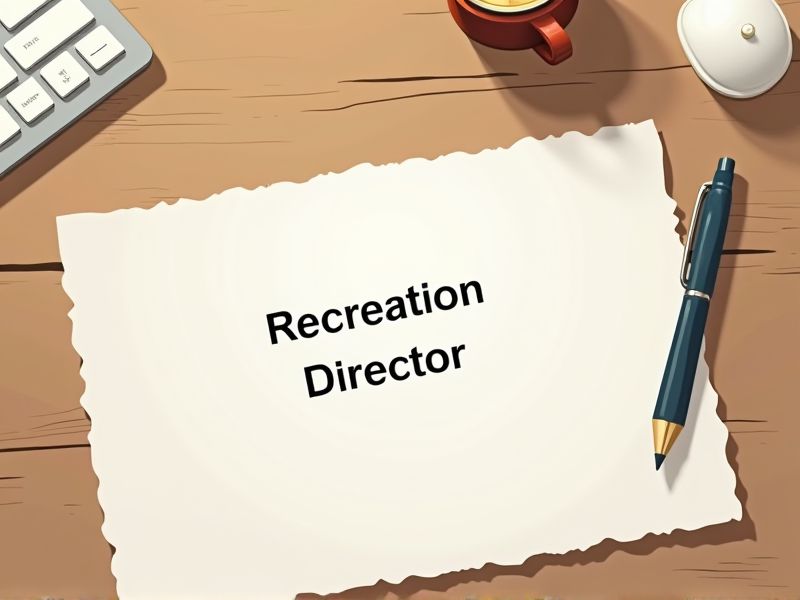
A Recreation Director plays a critical role in designing and overseeing programs that enrich community life, necessitating a specific set of competencies. Certifications ensure that a director possesses the necessary skills to manage recreational activities safely and effectively. Accredited certification programs can enhance credibility, reflecting adherence to industry standards and best practices. Here are some important certifications you may need as a Recreation Director.
Certified Park and Recreation Professional (CPRP)
The CPRP certification ensures a Recreation Director possesses the necessary knowledge and skills essential for effective park management and recreational program delivery. It provides validation of competency, which can elevate the professional's credibility and trust with stakeholders and the public. The certification encourages ongoing education and professional development, keeping directors updated with the latest trends and best practices in the field. Many organizations and municipalities consider CPRP as a criterion for hiring or promoting to ensure quality leadership and management in recreational services.
Certified Community Recreation Leader (CCRL)
A Certified Community Recreation Leader (CCRL) provides verified expertise and professional skills, which can enhance the credibility and efficiency of a Recreation Director. Certification reflects up-to-date knowledge of recreational management practices, which ensures effective and innovative programming. Formal certification can lead to better job opportunities and improved resource allocation by enhancing trust among community stakeholders. The CCRL sets standardized benchmarks that guide and improve decision-making and strategic planning, crucial traits for any Recreation Director.
Certified Therapeutic Recreation Specialist (CTRS)
Having a Certified Therapeutic Recreation Specialist (CTRS) as a Recreation Director ensures programs are designed to meet diverse individual needs based on evidence-based practices. They possess specialized skills to enhance the quality of life for individuals with disabilities or other limitations through therapeutic activities. CTRS professionals are trained to assess participants and implement tailored interventions, which can lead to improved outcomes in mental, emotional, and physical health. Their presence can also increase compliance with healthcare regulations and standards, contributing to a safer and more effective recreational environment.
Certified Aquatics Facility Operator
Hiring a Certified Aquatics Facility Operator ensures that the recreation director oversees safe water management, which directly reduces liability risks. Proper certification enhances the efficiency of facility maintenance, leading to cost savings in repairs and energy use. Certified individuals possess knowledge in current safety regulations, assisting the recreation director in maintaining compliance. Higher training levels often translate to improved customer satisfaction due to better managed amenities.
American Red Cross Lifeguard Certification
Holding an American Red Cross Lifeguard Certification enables a Recreation Director to ensure the safety of aquatic activities offered under their supervision. This certification provides essential skills in water rescue and first aid, enhancing the director's capability to respond effectively to emergencies. Recreation facilities often require staff with such certifications to comply with safety regulations, reducing the risk of accidents. The knowledge and competencies gained through this certification also bolster the director's credibility and effectiveness in program management.
CPR/AED Certification
CPR/AED certification equips a Recreation Director with essential skills to respond efficiently to cardiac emergencies, which ensures participant safety. Certification enhances the Director's ability to manage unforeseen health crises, reducing the risk of fatality during recreational activities. Many recreational centers and facilities require such certification as part of their risk management and compliance policies. Possession of CPR/AED certification reassures participants and their families, fostering trust in the competency and safety of the recreation program.
Certified Recreation/Leisure Supervisor (CRLS)
Certified Recreation/Leisure Supervisor (CRLS) credential enhances a Recreation Director's expertise in managing recreation programs effectively. With CRLS, a director gains insights into current best practices and innovative techniques in leisure services, leading to better program outcomes. Holding this certification signifies professional commitment and may improve credibility with stakeholders, fostering trust and cooperation. Achieving the CRLS status often results in more efficient program planning and execution, optimizing community engagement and satisfaction.
Event Planning Certification
Acquiring an Event Planning Certification provides a Recreation Director with essential skills in organizing and executing successful events. Certification ensures they are equipped with the knowledge to manage budgets, timelines, and resources effectively. It enhances their ability to handle unexpected challenges, leading to higher attendee satisfaction. The credential often increases confidence from stakeholders and participants, elevating the program's overall reputation.
Environmental Education Certification
Environmental education certification enhances a recreation director's ability to design programs that promote sustainability and conservation awareness among participants. Increased environmental knowledge equips directors to make informed decisions that minimize ecological impact and align with community values. Certification improves professional credibility, fostering trust among stakeholders and attendees who prioritize responsible stewardship. A well-informed recreation management strategy ultimately contributes to preserving natural resources, benefiting both ecosystems and community health.
Certified Facility Manager (CFM)
The role of a Certified Facility Manager (CFM) equips a Recreation Director with advanced knowledge in maintaining and improving facility operations. When a Recreation Director possesses CFM certification, they gain a strategic understanding of both financial management and operational efficiency, which is crucial for maintaining recreational spaces. Their expertise in risk management and safety protocols ensures that recreational facilities remain secure and compliant with industry standards. CFM training also enhances a Recreation Director's ability to plan and execute maintenance strategies, leading to longer facility life and increased user satisfaction.
Summary
When you obtain certifications as a Recreation Director, you enhance your credibility and expertise in the field. This increased skill set can lead to improved program quality and participant satisfaction in recreational activities. Organizations may recognize your enhanced qualifications by offering career advancement opportunities or pay raises. Community engagement and support could potentially rise, as stakeholders often respond positively to well-credentialed professionals.
